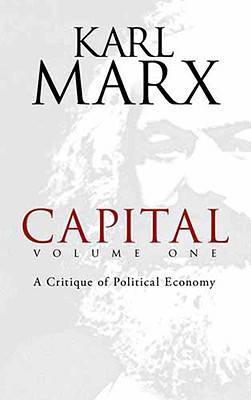
- Afhalen na 1 uur in een winkel met voorraad
- Gratis thuislevering in België vanaf € 30
- Ruim aanbod met 7 miljoen producten
- Afhalen na 1 uur in een winkel met voorraad
- Gratis thuislevering in België vanaf € 30
- Ruim aanbod met 7 miljoen producten
Zoeken
€ 24,45
+ 48 punten
Omschrijving
Hailed by Friedrich Engels as "the bible of the working class," this 1867 classic of political economics changed the course of history. Thirty years in the making, Capital, Volume I was the first installment of Karl Marx's three-part Das Kapital and the only volume published during his lifetime. Marx declared that society is evolving from crude, unbalanced economic systems toward a utopian state -- specifically, communism. His critiques of private property and class struggles aroused tremendous interest and exercised an influence that resonates to this day.
Marx offers a penetrating analysis of capitalism's inner workings, examining commodities, value, money, and other factors related to the system's historic origins and contemporary functions. These considerations form the framework for his conclusion: the system cannot be reformed and must be overthrown by a revolution, resulting in a socialist society in which production serves the needs of every individual rather than generating profits for the few.
Marx offers a penetrating analysis of capitalism's inner workings, examining commodities, value, money, and other factors related to the system's historic origins and contemporary functions. These considerations form the framework for his conclusion: the system cannot be reformed and must be overthrown by a revolution, resulting in a socialist society in which production serves the needs of every individual rather than generating profits for the few.
Specificaties
Betrokkenen
- Auteur(s):
- Uitgeverij:
Inhoud
- Aantal bladzijden:
- 880
- Taal:
- Engels
Eigenschappen
- Productcode (EAN):
- 9780486477480
- Verschijningsdatum:
- 17/03/2011
- Uitvoering:
- Paperback
- Formaat:
- Trade paperback (VS)
- Afmetingen:
- 133 mm x 209 mm
- Gewicht:
- 997 g

Alleen bij Standaard Boekhandel
+ 48 punten op je klantenkaart van Standaard Boekhandel
Beoordelingen
We publiceren alleen reviews die voldoen aan de voorwaarden voor reviews. Bekijk onze voorwaarden voor reviews.











